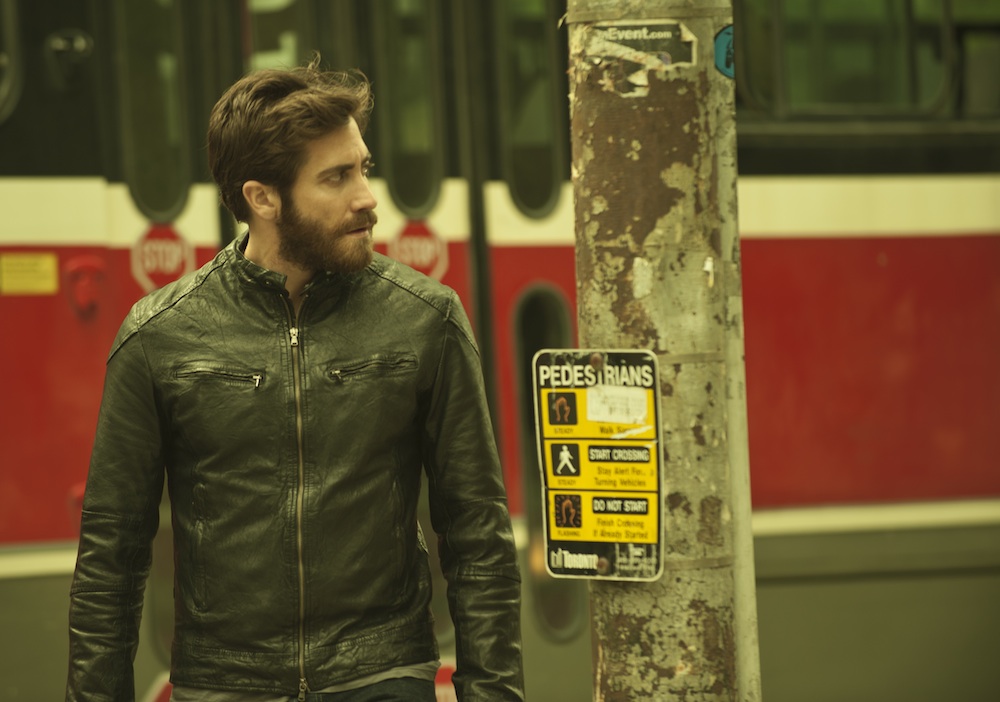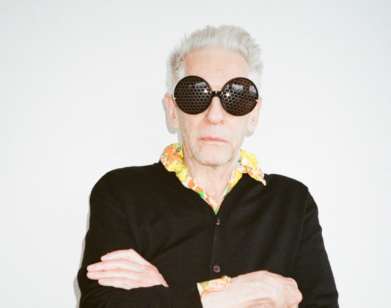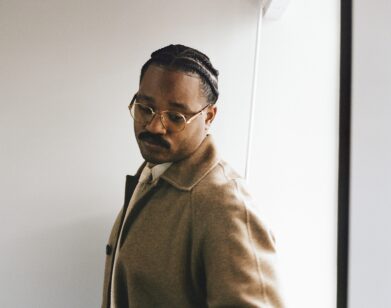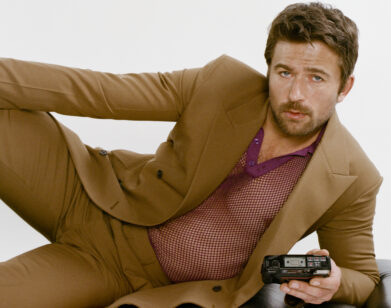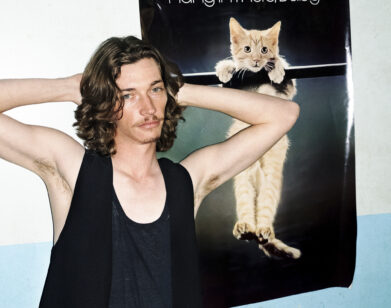Denis Villeneuve Turns a Corner
Denis Villeneuve has a vivid memory of running around his parent’s apartment as a child. “I remember turning a corner, and my father is waiting for me with a big sculpture of a mask: ‘Whoo!’ ” he says in the lobby of the Bowery Hotel in New York. “I was so afraid, I fell back.” There’s a reason that this image, in particular, comes back into the French-Canadian director’s mind: we are discussing his latest film release, Enemy, and, as he notes, “the movie is designed like that corner…the movie is built by the camera going into the corner and then you discover something,” he continues. “The audience gets used to that movement, until the end.” Perhaps this memory is “birth” of Enemy.
Last year, Villeneuve released Prisoners, a dark thriller exploring the limits of morality and sanity in the face of a horrific crime. The film starred Jake Gyllenhaal, Maria Bello, Terrence Howard, Melissa Leo, Paul Dano and an against-type Hugh Jackman, and turned the director into an international name. Enemy, which also stars Gyllenhaal, however, was filmed before Prisoners. It is Villeneuve’s English language debut after over a decade of critically-acclaimed French films such as Incendies (2010), Polytechnique (2009), and Maelstrom (2000) and, if possible, it is more caliginous than Prisoners. Based on a novel named The Double by the Nobel Prize-winning Portuguese author José Saramago , Enemy follows Adam, a dejected history professor barely existing in a bleak and ominously bland Toronto. One evening, Adam rents a film and spots his doppelgänger—a man who resembles him in every possible way —playing “Bellhop Number 3.” Reassured by his mother (Isabella Rosselini) that he is her one and only son, Adam decides to contact his actor double, a married man with a pregnant wife named Anthony. Both Adam and Anthony have unsettling moments of violence; there is no “good” and “evil” twin. As Villeneuve explains, “they are not victims. They are as dangerous as each other.”
Although, unlike his French language films, Villeneuve did not write the script for Enemy, it is a project he initiated.
EMMA BROWN: Can you tell me how the project came about?
DENIS VILLENEUVE: I read the book and fell in love with it. I didn’t have the chance to write it myself, so with a producer friend of mine, Niv Fichman, we found a screenwriter [Javier Gullón] that would have the right sensibility to adapt it. It was a shot in the dark, but it happens that it was my double—Spanish double—really someone who had a very similar sensibility to me that would have the same reflex and intuitions. He became a close friend and he speaks with the same awful English as me. [laughs] It was a really beautiful creative experience because we wrote the screenplay together; it’s a very personal project.
BROWN: Did you just pick up the book on a whim or were you a fan of José Saramago?
VILLENEUVE: I am not a Saramago expert at all. I read some of his books before, but the birth of this project is linked with friendship. I wanted to make a movie with Niv Fichman, who is one of the best producers in Canada, because he is very well known to be a master of co-production. He was a close friend of mine and, for 12 years, we were saying, “We need to make a project together, but what?” And then we started to brainstorm, to send books, and it appeared that Niv was the only producer on earth that had the rights on Saramago’s book The Double. But it’s really because Niv had the rights of this book; it was a total coincidence. Sometimes inspiration is strange because at that specific moment I had a lot of opportunity—different kinds of books, screenplays—but it was really that book that I felt was the next project.
BROWN: There are some fairly flagrant references to Kafka’s The Metamorphosis in the film, was that in the book or did you add it?
VILLENEUVE: Identity and monstrosity is something that is coming from the book. There is something of a paranoia feeling—a strangeness and tension that is coming from the book. The movie is not a faithful adaptation; it’s really inspired by the book. I tried to be as faithful as possible, but it’s a different object—it’s not an adaptation.
BROWN: The city of Toronto is a big presence in the film. What made you decide that Toronto was the right setting?
VILLENEUVE: In the book, Saramago describes the city as a huge monster—a megalopolis. There are not a lot of cities that are like this in the world, some in China and Japan and South America, but I wanted to do a movie in English. My neighbour city Toronto was there, and I went there scouting and I found out that Toronto had the perfect landscape for the movie—the never-ending suburbs and forest of skyscrapers that would be suitable to create that kind of tension, the paranoid environment, the anxiety. The thing I love about Toronto is that it’s virgin; nobody really shot there a lot before. [David] Cronenberg, obviously, but when you think about Toronto, it’s not a city that reminds you of a lot of movies like New York, Chicago, or even Tokyo. It’s really a city that has a kind of cinematic virginity. So this virginity was great for us because we felt free and had no references. We felt like we were the first ones, which was not true, but we did have that feeling. I tried to shoot Toronto like the phantasm I had when I read the book, which was to shoot the funky side of Toronto—the more Latin, South American side of Toronto like the white buildings. We brought color in it: color that would remind us of the atmosphere that was described in the book, the claustrophobic environment. Also, the book is set in the ’80s; I don’t know why and it’s tough to explain, but the ’80s are yellow for me.
BROWN: [laughs]
VILLENEUVE: When I think of the 1980s, the only color that comes to mind is a brown, yellowish color. I guess it’s coming from my life experience and it’s melancholia and sadness and a bit of joy.
BROWN: What color are the ’90s for you?
VILLENEUVE: Blue.
BROWN: Oh, really?
VILLENEUVE: Definitely. It’s a strong feeling. It’s not something I ever thought of before, but now it is obvious. Everybody agrees on set. [laughs]
BROWN: At what point did you decide that Jake should be involved?
VILLENEUVE: The movies I did before were movies with a lot of characters, a lot of locations, and low budgets, which meant that I was running all over the place and never had the chance to build a relationship with an actor. I was always having big, strong relationships with the cinematographers or editors or production designers, but not with the actors. And I was in the need of that, because when you are in a relationship with an artist you are able to dig and discipline; I needed to explore directing and acting and go off the tracks and try new things. So I needed someone who would trust me and would be willing to explore with me. [Enemy] was perfect because it’s all about one character. So I was looking for an English-speaking actor that would have all the qualities that I was looking for: a creative actor that has a lot of profoundness; that is playful, like in Donnie Darko—that ability to play in the fantastic world; that is profound, like in Brokeback Mountain; and precise. I always loved Jake on the screen and as I was starting my casting, I learned that he was available, so I took a chance. I was supposed to approach someone from Europe, but I convinced everybody that it would be fantastic to work with Jake. I sent him a long letter explaining why I wanted to do this film, what was the meaning for me, and how I wanted to do with the screenplay. Then he invited me to drink wine with him in New York and we drank the whole bottle and became friends. So it’s the birth of a creative friendship.
BROWN: So this was before Prisoners?
VILLENEUVE: Yes. I knew before I started Enemy that I would do Prisoners, and I was looking for someone to do the detective in Prisoners. As I was shooting Enemy, the more I was working with Jake, the more I was impressed by his skills, his ability, also by his creativity. In Prisoners, I really needed an actor that would have the will to invade the part and create a character that was not necessarily on the pages.
BROWN: Did you find having a relationship with a particular actor as fruitful as you’d hoped it would be? Will you try and build a similar relationship in the future with other actors?
VILLENEUVE: Jake is someone that became a friend. It’s a friendship based on no bullshit—truthfulness. It’s very precious; this friendship is very important for me. I never have been so inspired before working with Jake, so I would love to work with him again. It’s not about actors; the problem is that you cannot make promises because you never know what your next project will be. My next project, next summer, if it works, the lead is supposed to be a woman, so it’s a bit tricky for Jake.
BROWN: Did you ever have an imaginary friend?
VILLENEUVE: When I was a kid, I was always going to bed creating a story and that was the birth of filmmaking for me. I would like going to the dream-state by telling the story to someone else in my mind. That was my imaginary friend; it was an imaginary audience listening to my story.
ENEMY COMES OUT TODAY, MARCH 14. DENIS VILLENEUVE WILL BE HOSTING A SPECIAL Q&A AFTER THE 7:50 PM SCREENING OF THE FILM AT THE ANGELIKA IN NEW YORK CITY TONIGHT.

